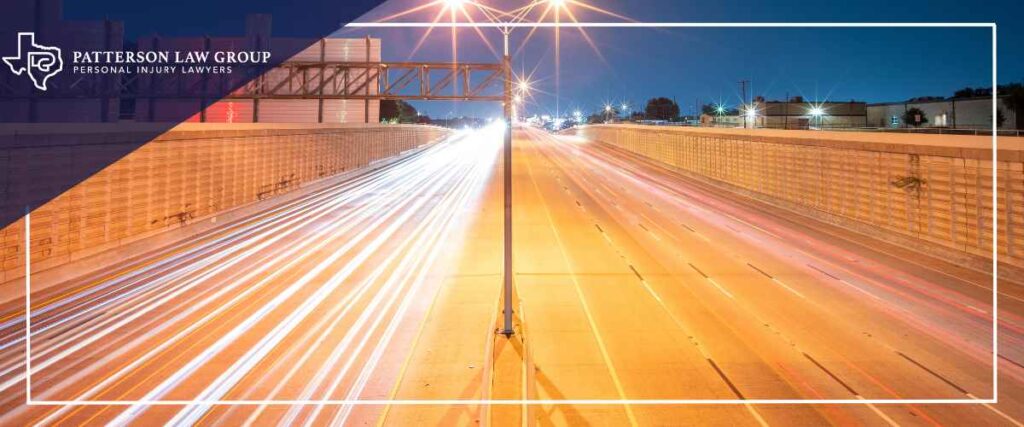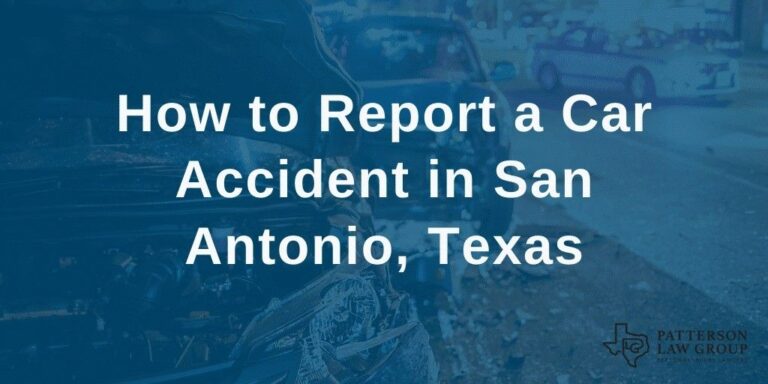Fort Worth is a busy, populous city full of activity. While city officials and the state government are taking steps to improve road conditions for drivers, accidents are still common.
According to some Reddit users, traffic in Fort Worth is always “So, so bad.” User ducksflytogether1988 stated that though they live just three miles from Lifetime Fitness on Golden Triangle, it can take them over 20 minutes to arrive due to ongoing construction and general traffic congestion on I-35.
Those long-time residents used to the traffic nonsense are growing tired of the constant “sit and wait” situations on major roads and highways in and around the city.
Not only that, but there are ongoing issues with accidents caused by distracted drivers, construction zones, and speeding.
At Patterson Law Group, we understand the frustration of poor traffic conditions. Our experienced car accident lawyers are here to help if you are involved in an accident caused by someone else’s negligence.
That said, we also encourage residents and visitors to learn more about traffic patterns, commute times, and alternate routes to help avoid some of the traffic, frustration, and potential accidents.
An Overview of Fort Worth Travel Times in 2023
In the Fort Worth area, travel time increased by nine seconds from 2022 to 2023. While that does not seem like much, it adds up when this amount of time is added to each trip. It is also estimated that those who drive regularly in and around Fort Worth spend 46 hours on the road due to congestion.
If you are forced to drive in rush hour traffic, you added two days and one hour to your time on the road in 2023 due to congestion, accidents, and other factors.
The Worst Times for Traffic in Fort Worth
Navigating Fort Worth’s roads and highways can test patience and skill, particularly during peak traffic hours.
Morning commutes turn highways into slow-moving streams of vehicles from 6:30 AM to 9:00 AM as residents make their way to work, often under the bright Texas sun. Evening rushes are no less daunting, especially from 4:30 PM to 7:00 PM when the day’s end sends a surge of cars flooding onto the roads, all eager to return home.
Holidays and special events can further exacerbate these conditions, sometimes making Fort Worth’s roads seem more like parking lots than thoroughfares.
Navigating Through Construction-Related Road Delays in Fort Worth
Construction projects are ubiquitous in Fort Worth, contributing significantly to traffic congestion and delays. These projects, essential for the city’s infrastructure improvements and expansions, often result in rerouted traffic, closed lanes, and slow-moving conditions.
Understanding the areas affected by construction can help commuters plan their routes more effectively and avoid significant delays.
Some areas undergoing construction include:
- Interstate 35W Expansion: Major upgrades and expansions are ongoing along I-35W, a critical route for commuters and commercial traffic. This project aims to alleviate congestion but currently causes daily delays.
- Chisholm Trail Parkway Enhancements: Enhancements and maintenance work are underway to improve traffic flow and safety on Chisholm Trail Parkway.
- Loop 820 Upgrades: Sections of Loop 820 are undergoing upgrades to accommodate the growing traffic demands and improve overall traffic management.
The impact of these construction zones includes more than just added minutes to your commute. They often lead to detours, tighter lanes, and reduced speed limits, significantly increasing the likelihood of congestion and accidents. Keeping abreast of construction updates can help plan alternate routes or adjust travel times.
Legal Considerations in Construction Zones
Construction zones increase the potential for accidents. A specialized accident lawyer in Fort Worth can provide legal support if one occurs, whether a fender bender or a more severe collision.
They can help you navigate the complexities of accidents in these zones, from gathering evidence to dealing with insurance claims, ensuring that those affected receive fair compensation and justice.
Identifying High-Risk Roads and Intersections in Fort Worth
Navigating through Fort Worth requires awareness of its most hazardous roads and intersections. These areas represent significant challenges for drivers, often due to heavy traffic flows, complex navigation, and sometimes inadequate road designs.
Some of the most dangerous intersections and roads in Fort Worth include:
- I-35W near Downtown: This stretch of highway sees frequent congestion and rapid changes in traffic pace, contributing to a high incidence of collisions. The blend of local and through traffic complicates driving behaviors.
- The intersection of East Lancaster Avenue and Riverside Drive: Known for confusing traffic signals and heavy pedestrian traffic, this intersection is a hotspot for accidents, often involving vulnerable road users.
- West Loop 820 and Camp Bowie West Boulevard: This intersection’s complexity and heavy traffic volume create a breeding ground for fender benders and serious accidents, particularly during rush hours.
Factors Contributing to High Accident Rates
Understanding why these areas are hazardous is crucial for taking precautionary measures.
Key factors include:
- High Traffic Volumes: The sheer number of vehicles contributes to congestion and increases the likelihood of accidents.
- Speed Variations: Sudden changes in speed limits and unexpected traffic slowdowns can lead to rear-end collisions.
- Complex Road Layouts: Intricate or poorly signed intersections can confuse drivers, making navigation more challenging and increasing the chance of accidents.
- Lack of Safety Features: In some areas, the absence of adequate pedestrian crossings, bike lanes, and clear signage heightens dangers for all road users.
Recognizing these high-risk areas and their underlying issues is the first step towards safer driving in Fort Worth. If you are involved in an accident due to traffic congestion, distracted driving, or any other reason, we are here to help. Our Fort Worth car accident attorneys can help you determine liability and recover compensation.
Navigating Fort Worth Safely: Understanding the Law, Finding Alternative Routes, and Avoiding Accidents
Staying safe and avoiding traffic snarls on Fort Worth’s roads requires understanding the law and proactive strategies. Alternative routing can enhance your driving experience and keep you safer by sidestepping high-risk areas and congested zones.
Learn more here.
Important Fort Worth Traffic Laws to Know and Follow
Navigating the roads of Fort Worth requires skill, patience, and a solid understanding of local traffic laws to ensure safety and compliance. Familiarizing yourself with these regulations can significantly reduce the risk of accidents and traffic violations.
- Right-of-Way Rules: Understanding who has the right of way at intersections, pedestrian crossings, and while merging on highways is fundamental. Fort Worth drivers are expected to follow these rules diligently to prevent collisions.
- Speed Limits: Fort Worth enforces speed limits strictly to protect all road users. Residential areas, school zones, and construction areas often have reduced speed limits that must be adhered to.
- Use of Mobile Devices: Like much of Texas, Fort Worth prohibits using handheld mobile devices for calling or texting while driving. Hands-free technology is encouraged to minimize distractions.
- Seat Belt and Child Safety Seat Laws: Texas law requires all passengers in a vehicle to wear seat belts. Children must be secured in appropriate child safety seats until they reach the age limit or height/weight requirements.
- Driving Under the Influence (DUI) Laws: Fort Worth takes DUI offenses seriously. The legal Blood Alcohol Concentration (BAC) limit is 0.08%, with stringent penalties for those found driving over the limit.
- Signal Use: Proper signaling before changing lanes or turning is not just courteous; it’s the law. This practice prevents accidents and ensures smoother traffic flow.
Tips for Finding Safer Routes
You can find alternative routes if the main roads or highways are congested or blocked. Some tips to help you find these include:
- Utilize Traffic and Navigation Apps: Modern technology offers a significant advantage in avoiding traffic congestion and identifying safer routes. Apps like Google Maps, Waze, and Apple Maps provide real-time traffic updates and alternate route suggestions.
- Plan Your Journey: Before starting your trip, research your route for any known construction zones or high-risk areas. Planning allows you to choose the safest path.
- Listen to Local Traffic Reports: Stay informed with local traffic news through radio or online traffic reporting tools. These resources can alert you to recent accidents and heavily congested areas.
- Familiarize Yourself with Lesser-Known Roads: Sometimes, the less traveled roads provide safer and more pleasant journeys. Spend time exploring alternate paths during less busy times to become comfortable with them.
Tips for Avoiding Accidents
Everyone has a responsibility to stay safe and follow the rules when driving. Some tips that can help you do that and avoid accidents include:
- Drive Defensively: Always be aware of your surroundings and anticipate the actions of other drivers. Keeping a safe following distance and being cautious through intersections can prevent many collisions.
- Obey Traffic Laws: Speed limits, traffic signals, and road signage are all designed to keep traffic flowing safely. Respect these rules to minimize risks to yourself and others.
- Stay Informed on Weather Conditions: Adverse weather can dramatically affect road safety. Heavy rain, fog, or ice can lead to dangerous driving conditions. Checking the weather before leaving can help you decide if alternative routes or delaying your trip is safer.
- Avoid Peak Traffic Times: Adjust your schedule to bypass the worst traffic. Early mornings, lunchtime, and late afternoons typically see the highest congestion levels.
Stay Safe
Besides knowing the laws, finding other routes, and using smart driving tips, there are other ways to ensure you are safe on the road. These include:
- Regular Vehicle Maintenance: Ensure your vehicle is in good working order. Regular checks on brakes, lights, tires, and windshield wipers can prevent accidents.
- Use Technology Wisely: While navigation apps are helpful, avoid using your phone or other devices in a way that distracts you from driving.
- Be Prepared for Emergencies: Keep an emergency kit in your vehicle, including a first-aid kit, flashlight, and basic tools. Knowing you’re prepared can make unexpected situations less stressful.
Incorporating these strategies into your daily commute can lead to a safer, more enjoyable driving experience in Fort Worth. Awareness and preparation are crucial to navigating the city’s roads smoothly and safely.
How Patterson Law Group Can Help if You Are Involved in a Fort Worth Car Accident
If you are involved in a car accident in Fort Worth, Patterson Law Group stands ready to offer comprehensive support and guidance. Our team is familiar with the complexities of Texas traffic laws and is dedicated to advocating for the rights of accident victims.
Here’s how we can assist you:
- Guidance Through the Legal Process: From the moment you enlist our help, we provide the compensation you deserve. We handle all aspects of your claim, from negotiating with insurance companies to representing you in court, if necessary.
- Accident Investigation: Our team conducts thorough investigations to gather evidence and establish liability. We work with accident reconstruction experts, interview witnesses, and compile all necessary documentation to build a strong case on your behalf.
- Guidance on Medical Treatment: Understanding the importance of your health and recovery, we can guide you towards medical professionals who can assess and treat your injuries, ensuring that your health recovery is documented and linked to the accident for your claim.
- Personalized Support: We recognize that each case is unique. We offer personalized legal strategies tailored to your accident’s specific circumstances and impacts. Our goal is to alleviate the stress of legal proceedings, allowing you to focus on your recovery.
Enlisting Patterson Law Group means getting an advocate committed to your cause, ensuring you receive the legal support and compensation you are entitled to following a car accident in Fort Worth.
Navigating the Road to Recovery with Confidence
Mastering Fort Worth traffic and staying vigilant about safety can help decrease the likelihood of unfortunate accidents. However, knowing a dedicated team is ready to support you can make all the difference if you are in a car accident.
Patterson Law Group brings a wealth of knowledge and experience, as well as a commitment to justice and the well-being of Fort Worth residents.
By prioritizing safety, adhering to local laws, and understanding the resources available for legal assistance, drivers can confidently navigate the roads, equipped to confront challenges that may arise.






